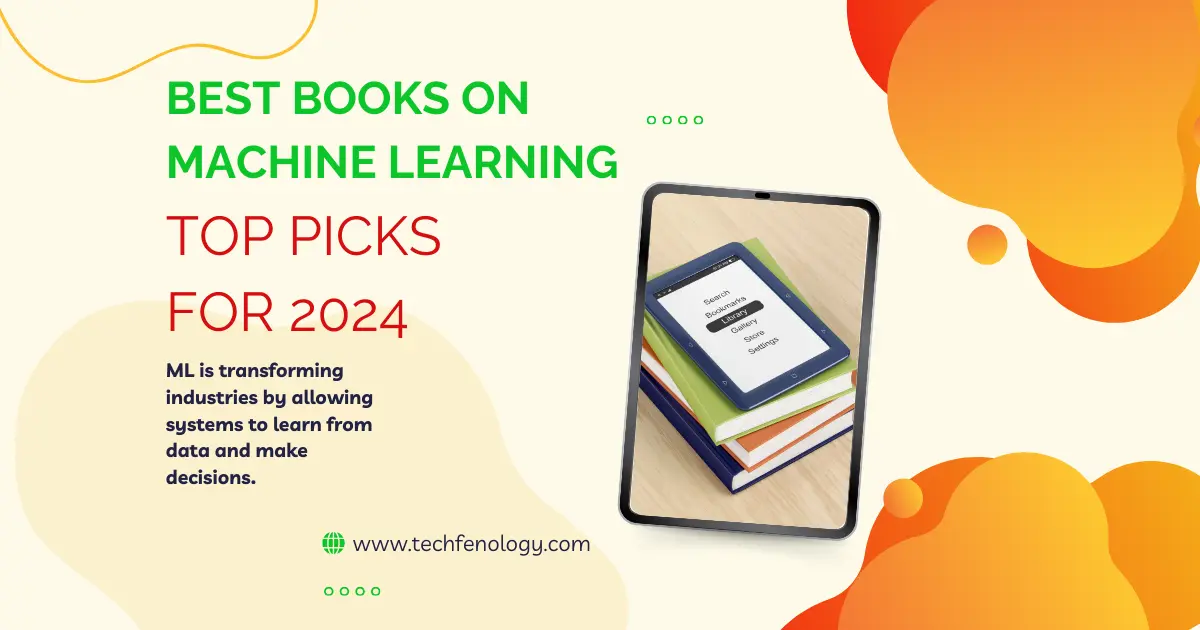
Best Books on Machine Learning: Top Picks for 2024
ML is transforming industries by allowing systems to learn from data and make decisions. With a host of applications from predicting analytics to self-driving cars, ML is an essential field in today’s tech-driven world. Besides the numerous resources that are out there, books still have their own timeless value in facilitating long-term structured learning. Books can help you learn everything there is to know about machine learning, regardless of if it’s your first time or you’re an experienced professional.
Foundational Concepts in Machine Learning
Need to know machine learning basics before going through particular books Mastering the foundations of supervised and unsupervised learning, neural networksand model validation will….establish a solid foundation to move even furthererrar! These basics form the foundation on which any would-be ML expert needs to build upon.
Best Books for Beginners
Hands-On Machine Learning with Scikit-Learn, Keras
For a beginner, this is a gem of the book. It gives you an organized guide in learning machine learning with Python libraries. Géron does a fantastic job of balancing theory with projects to make the techniques practical, even if the underlying concepts are complex.
- Review: Covers fundamental machine learning concepts through hands-on code samples.
- In Short: Understand how to create and train models with familiar Python packages.
Python Machine Learning by Sebastian Raschka and Vahid Mirjalili
Essential Guide to Machine Learning with Python.
- Summary: Basic and advanced concepts of machine learning & deep learning.
- The nuts and bolts of Python: focuses on the left-brain side of programming, so great for hands-on learners.
Machine Learning Yearning by Andrew Ng
A concise and intuitive guide by the online education and machine learning trailblazer, Andrew Ng
- Aggregate: Business-oriented application of machine learning.
- Description: Learn how to structure machine learning projects and avoid common pitfalls
Intermediate Level Books
Book: Pattern Recognition and Machine Learning, Author: Christopher M. Bishop
Patterns recognition and machine learning by christopher m. bishop
- Brief: From Bayesian networks to EM algorithm.
- Summary: Comprehensive sponsors coverage of theory as well web Aesthetics with Clinical Founding
Book: Machine Learning – Probabilistic Perspective, Kevin P. Murphy
This is ideal for those who know something in the area, and wishes to do a deeper introduction into probabilistic models.
- Summary (of the lot): In-depth abstract on probabilistic graphical models and their derivative concepts.
- Key Points: Long explanations and as many examples as possible (to truly understand it)
Goodfellow, Ian and Bengio, Yoshua and Courville,Aaron ) : machine Learning
Introducing an important book on deep learning by three best experts in this field.
- Summary: Extensive explanation of deep learning from concepts to implementations.
- Summary: Overview of neural networks, optimization algorithms and deep learning use cases.
Advanced Level Books
David Barber, Bayesian Reasoning and Machine Learning
Textbook: A survey of Bayesian methods in machine learning.
- Summary: Investigates the use of Bayesian inference, graphical models and variational methods.
- Quick Summary: Detailed mathematical exposition on Bayesian methods.
Reinforcement Learning Handbook by Richard S. Sutton and Andrew G. Barto
A solid book about understanding reinforcement learning.
- Type: Theory Coverage of Reinforcement Learning Algorithms.
- TL;DR: Understand Markov Decision Processes, Dynamic Programming and Policy Gradient-Methods.
David J.C. MacKay: Information Theory, Inference and Learning Algorithms
So an unusual book that mixes information theory, inference and machine learning.
- Summary: It discusses topics like information theory and neural networks.
- Highlights: Interesting connections among various areas in ML.
Books on Specialized Topics
Natural Language Processing with Python by Steven Bird, Ewan Klein
A book any NPLERS uses must have.
- Summary: A hands-on resource for diving into text-based data, approaching real-world applications with Python.
- Key Takeaways: Text Processing, Classification and Parsing
Probabilistic Graphical Models: Principles and Techniques, Daphne Kollerirebase2++; CCC for Java
The classic resource is a gentle introduction to probabilistic graphical models.
- Overview: the course will detail all the pasta and PGM concepts, algorithms, and applications in full.
- Key Takeaways: the learner will have mastered the approaches to actually create and use graphical models
Machine Learning for Hackers by Drew Conway and John Myles White
an ideal starting point for those with a coding background planning to plunge into machine learning.
- Overview: the course’s content presents several practical projects that serve to demonstrate the theory-based exposure portions.
- Key Takeaways: without devolving too much onto side theory branches, the content will mostly imply the practical approach to learning things and people faced with real-world problems.
Practical Application Books
Building Machine Learning Powered Applications
this book serves as a guide to deploying machine learning in practical applications.
- Overview: the course is supposed to provide a structured step-by-step guide to creating, deploying, and scaling a machine learning application.
- Key Takeaways: the content would focus mostly on the application-based learning bits: each step in the ML pipeline, from the prototyping to the production.
Machine learning Bootstrap time by Andreas C. Müller and Sarah Guido
This is for the people who want to speed up quickly in machine learning with Python.
- What you will learn: Introduction to the most important machine learning concepts and Python tools.
- Key Takeaways: Practical examples and exercises to support the points from earlier
Data Science from Scratch by Joel Grus (code examples in Python)
Intended for the Do-ers: Few pre-built libraries; built by you!
- Summary: This Course was made to Learn Data Science and Machine Learning from scratch.
- Highlights: Assemble ML algorithms from the ground up to see how they function internally.
Books for Mathematical Foundations
The Elements of Statistical Learning – by Trevor Hastie, Robert Tibshirani
Another classic book that covers the statistics behind machine learning
- Focus: Statistical learning (note, on-demand version of it is offered);
- Highlights: Intuitive explanations and a plethora of statistical models.
Machine Learning: Theory and Algorithms by Shai Ben-David,Shai Shalev-Shwartz
Solid theoretical base (in Machine learning).
- Overview: In depth-matter on algorithms and theoretical concepts.
- Takeaways: Crystal clear explanations for complex maths concepts.
Mathematics for Machine Learning by Marc Peter Deisenroth. Aldo Faisal and Cheng Soon Ong
Machine learning algorithms can be regarded as representing various parts of the pipeline and a summary is provided below.)
- Best For: Linear Algebra, Calculus and Probability Theory for ML
- Mathematics for ML: Basic must know tools every data scientist require in order to /build and Understand the ml model
Comparative Analysis of Books
The best book for you would naturally vary, depending on how much of the tool you currently know and what your goals are with respect to learning. Géron may be more appealing to beginners in a practical sense, but those who seek deep theoretical background could have chosen Bishop or Murphy instead. Those with a more mathematical or technical […] Advanced readers can learn even more from specialized texts such as those on Q-learning by Barber and Model-free Learning […].
Books (a treasure trove for machine learning aspirants) They have something for everyone from beginner-friendly guides to the more advanced texts. The right book can empower you, regardless of whether youre a beginner or looking to enhance your knowledge base.
FAQs
Which is the best book to get started in machine learning?
Introduction to “Hands-On Machine Learning with Scikit-Learn, Keras & Tensorflow” by Aurélien Géron — Write a review as…
How much is math important in Machine Learning?
For machine learning, mathematics plays an important role to grasp root concepts and algorithms. Having foundational knowledge in linear algebra, calculus and probability does wonders.
Are there free resources or books?
The book Machine Learning Yearning by Andrew Ng (yes, free) is also an excellent resource that helps you understand practical aspects of implementing machine learning projects.
Can you get into machine learning without knowing how to program?
And although knowing how to program is definitely beneficial, some books & courses for absolute beginners are also cater in the direction of their non-programming background. Thereby, also becoming basic Python knowledge and machine learning concepts in the process can be extra helpful.
